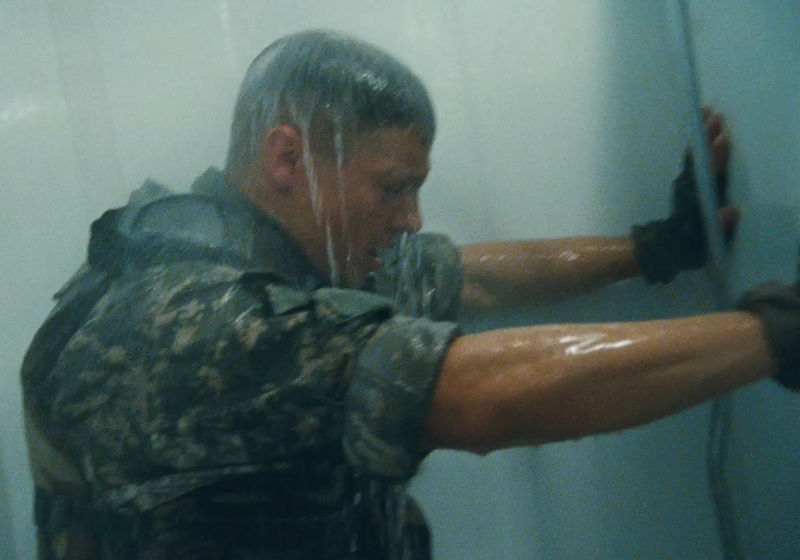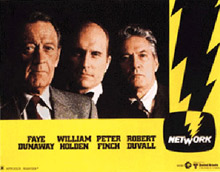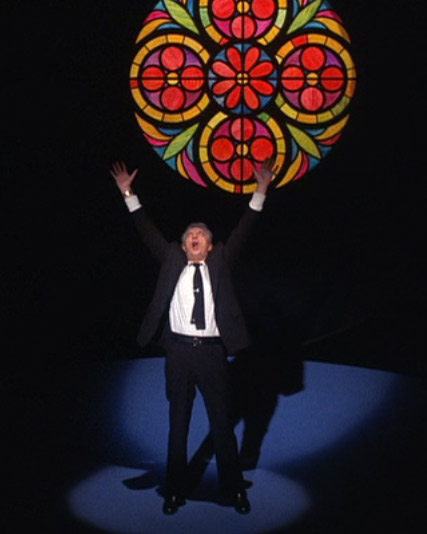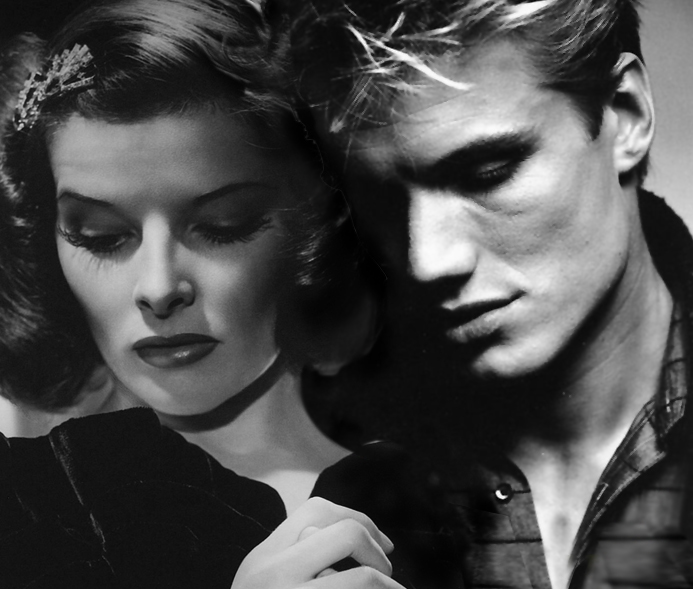April Showers: The Hurt Locker
 Tuesday, April 12, 2011 at 11:32PM
Tuesday, April 12, 2011 at 11:32PM 
Jeremy Renner multi-tasking, shower and laundry.
 April Showers,
April Showers,  Jeremy Renner
Jeremy Renner The Film Experience™ was created by Nathaniel R. All material herein is written by our team. (This site is not for profit but for an expression of love for cinema & adjacent artforms.)
Follow TFE on Substackd
 Tuesday, April 12, 2011 at 11:32PM
Tuesday, April 12, 2011 at 11:32PM 
Jeremy Renner multi-tasking, shower and laundry.
 Tuesday, April 12, 2011 at 5:31PM
Tuesday, April 12, 2011 at 5:31PM In honor of Sidney Lumet who passed away this weekend, we're re-publishing The Film Experience retrospective on Network from a few years ago. It's new to some of you!

One Angry Man
One thing I suspect about director Sidney Lumet: He liked his drama super-sized, Empire State Building big. No 800 lbs gorillas in the room please, make it King Kong. Give them 16 tons of drama. Lumet wanted grunting, sweating, lunging, screaming, gargantuan desperate drama like the kind you get in Dog Day Afternoon, Before the Devil Knows You’re Dead and Serpico. Never mind 12 Angry Men. How about 1 Angry Man, Sidney Lumet, and in the case of Network -- arguably his best film -- one angry fictional man named Howard Beale (Peter Finch). Network eventually gets around to naming Beale the “mad prophet of the airwaves” but it’s also a self descriptive tag. The movie is mad as hell and prophetic, too. Network is Howard Beale and Howard Beale is Network. This impressively large but also miniature film --it's not hard to imagine it as a stage play -- swings wildly from mood to mood like its bipolar madman.
A lot of movies steal from Network but I love the borrowing that Network does right out of the gate, in omniscient detached voiceover.
In his time Howard Beale had been a mandarin of television. The grand old man of news with a hot rating of 16 and a 28 audience share. In 1969 however his fortunes began to decline. He fell to a 22 share. The following year his wife died and he was left a childless widower with an 8 rating and a 12 share.
We're in the boredom killing business.
That puts us in the shithouse. That's where that puts us.
 Network is an easy film to quote and its super sculpted and scalding dialogue is undoubtedly the reason why the screenplay (by triple Oscar winner Paddy Chayefsky) is so lauded. It’s the type of talky feature that's jerry-rigged to draw attention to its themes, BIG ideas, diamond hard one liners and showcased monologues. But words aside, the plotting is also tight and strong. I can’t think of a single film that’s more interested in stopping for speeches that also moves with breakneck speed through the twists and turns of its various plots.
Network is an easy film to quote and its super sculpted and scalding dialogue is undoubtedly the reason why the screenplay (by triple Oscar winner Paddy Chayefsky) is so lauded. It’s the type of talky feature that's jerry-rigged to draw attention to its themes, BIG ideas, diamond hard one liners and showcased monologues. But words aside, the plotting is also tight and strong. I can’t think of a single film that’s more interested in stopping for speeches that also moves with breakneck speed through the twists and turns of its various plots.
Plot A: Howard Beale threatens to kill himself on air, leading to rubberneck ratings jumps and corporate exploitation of his sudden insanity. As Beale slips deeper into a complete psychotic break, corporate sharks Diana Christensen (Faye Dunaway) and Frank Hackett (Robert Duvall) start swimming, devouring the smaller fish at the network like Max Schumacher, as they try to capitalize on Beale's popularity with the public who embraces his catchphrase:
I'M AS MAD AS HELL, AND I'M NOT GOING TO TAKE THIS ANYMORE!
 Tuesday, April 12, 2011 at 2:01PM
Tuesday, April 12, 2011 at 2:01PM  In this Reader Appreciation series we're getting to know the Film Experience community, one person at a time ;) Today's interviewee is Ziyad who was born in Barcelona and is currently in Tel Aviv. He's truly international.
In this Reader Appreciation series we're getting to know the Film Experience community, one person at a time ;) Today's interviewee is Ziyad who was born in Barcelona and is currently in Tel Aviv. He's truly international.
So let's jump right in.
Nathaniel: Do you remember your first filmgoing experience?
ZIYAD: Beauty and the Beast, I was 5 years old, the whole family (my parents and 2 brothers) went to a late showing, I fell asleep after 5 minutes and I woke up after in the ending credits, I got so pissed they didn't wake me so I forced my parents to take me again the next day.
Dedication. I love it. When did you start reading?
Around September 2004, I was checking if Javier Bardem had a chance at getting nominated for The Sea Inside, I loved the "actressexuality", bookmarked it instantaneously and since then visited on a daily basis. My favorite part: Film Bitch Awards -- I owe you copyrights for doing my own with your extra categories as well, EVERY YEAR, the difference is that I do it for myself and have no place to share it.
Julianne Moore, she is my goddess, my face glows by just seeing her, in anything; Meryl Streep... "She could play Batman and be the right choice"; And a tie between Carmen Maura, Hiam Abbass, Susan Sarandon, Bette Davis, and Kate Winslet. SORRY! Right now Emma Stone is everything to me. Every time I watch Easy A I fall a little bit more in love with her.
I'm horrible at following orders.
Take one Oscar away from something and give it to something else.
I'm going to have to do two. I take Angelina Jolie's Oscar for Girl, Interrupted and give it to Julianne Moore for Magnolia (god, it HURTS physically that she wasn't even nominated). I think I could take every Oscar and give it to Julianne Moore.
 All the Oscars Belong To Her.
All the Oscars Belong To Her.
The second one, is actually a movie... I would take A Beautiful Mind's and give it to Amelie. Best Movie Ever.
The Godfather Trilogy. I'm just lazy.
 Previous Reader Spotlights:
Previous Reader Spotlights:
Andrew, Yonatan, Keir, Kyle, Jamie, Vinci, Victor, Bill, Hayden, Dominique, Murtada, Cory, Walter, Paolo, Leehee and BBats
 Tuesday, April 12, 2011 at 12:31PM
Tuesday, April 12, 2011 at 12:31PM the first and last images and dialogue from motion pictures.
the images

the dialogue for a second clue
first: Your bible. Don't lose it now.
last: Home.
ANOTHER CLUE? This film stars two of the biggest stars of the 50s, one of them is in the shot above and the other left her shoes on the road. It was not nominated for any Oscars.
Can you guess the movie?
See the answer after the jump.
 first and last
first and last  Tuesday, April 12, 2011 at 10:41AM
Tuesday, April 12, 2011 at 10:41AM  Today's DVD releases cover a lot of ground. But let's start with the most amusing. Two collections arrive today. One, Tracy & Hepburn the Definitive Collection, collects every film that co-starred Spencer Tracy & Katharine Hepburn, one of moviedom's most legendary couples both onscreen and off. The other is Dolph Lundgren Triple Threat. Hee. Because my movie-addled brain is always mushing things together I couldn't help but imagine a Lundgren/Hepburn series for a split second. What kind of movie could they possibly have made together?
Today's DVD releases cover a lot of ground. But let's start with the most amusing. Two collections arrive today. One, Tracy & Hepburn the Definitive Collection, collects every film that co-starred Spencer Tracy & Katharine Hepburn, one of moviedom's most legendary couples both onscreen and off. The other is Dolph Lundgren Triple Threat. Hee. Because my movie-addled brain is always mushing things together I couldn't help but imagine a Lundgren/Hepburn series for a split second. What kind of movie could they possibly have made together?
The Lundgren triple doesn't even include any movie you've heard of. It's mostly post 90s stuff. Unfortunately none of the films are musicals despite the title of "triple threat" . When you hear triple threat you automatically think of a actor/singer/dancer, right? Make your next straight-to-DVD action pic a musical, Dolph.
The best of the new releases is Claire Denis's typically hypnotic and disturbing White Material, which I wrote briefly about in January and the worst is Harry Potter and the Deathly Hallows Pt. 1 which I'm off-trend about it because it got wildly thumbs up reviews but I think it's easily the worst Potter feature (give or take the Chamber of Snoozing) and aside from that admittedly stellar animated sequence, it was the most cynical (and successful) cash grab of 2010. The debuts I haven't seen: the Gilles Marchand thriller Black Heaven starring Grégoire LePrince-Rinquet (Love Songs) and the acclaimed documentary Marwencol, about a brain damaged man recreating a World War II era town to 1/6th scale.
Finally, Country Strong also debuts on DVD today. But since we've heard Gwyneth's lovely voice crooning the tracks, is there any reason left to see the movie? Have any of you?
I feel a poll coming on...